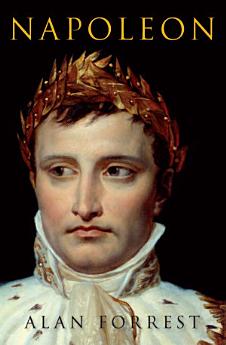Napoleon
অক্টো ২০১১ · Hachette UK
৪.০star
১ টা পৰ্যালোচনাreport
ইবুক
352
পৃষ্ঠা
family_home
যোগ্য
info
reportমূল্যাংকন আৰু পৰ্যালোচনা সত্যাপন কৰা হোৱা নাই অধিক জানক
এই ইবুকখনৰ বিষয়ে
On a cold December day in 1840 Parisians turned out in force to watch as Napoleon's coffin was solemnly borne down the Champs-Elysées on its final journey to the Invalides. The return of the Emperor's body from the island of St Helena, nearly twenty years after his death, was a moment they had eagerly awaited, though there were many who feared that the memories stirred would only further destabilize a country that had struggled for order and direction since 'the little corporal' was sent into exile after Waterloo.
Alan Forrest tells the remarkable story of how the son of a Corsican attorney became the most powerful man in Europe, a man whose political legacy endured long after his lonely death many thousands of miles from France. Along the way, he cuts away the layers of myth and counter-myth that have grown up around Napoleon, a man who mixed history and legend promiscuously, and shows how he was as much a product of his times as he was their creator.
The convulsive effect of the Revolution on French society, and the new meritocracy it ushered in, afforded men of this generation opportunities that were unimaginable under the Ancien Régime. Napoleon seized every chance that was offered him, making full use of his undoubted abilities and charismatic presence. But the Empire he created, stretching across most of the European continent, was not the work of one man. It was a collective enterprise that depended on the work and vision of thousands of administrators, army officers, jurists and educators, and The Age of Napoleon is as much their story as his.
In a book that takes in everything from Napoleon's ill-fated expedition to Egypt to the festivals that punctuated the Imperial calendar, Alan Forrest draws on original research and recent scholarship to draw a fresh and compelling picture of one of the most dramatic periods in the history of Europe.
Alan Forrest tells the remarkable story of how the son of a Corsican attorney became the most powerful man in Europe, a man whose political legacy endured long after his lonely death many thousands of miles from France. Along the way, he cuts away the layers of myth and counter-myth that have grown up around Napoleon, a man who mixed history and legend promiscuously, and shows how he was as much a product of his times as he was their creator.
The convulsive effect of the Revolution on French society, and the new meritocracy it ushered in, afforded men of this generation opportunities that were unimaginable under the Ancien Régime. Napoleon seized every chance that was offered him, making full use of his undoubted abilities and charismatic presence. But the Empire he created, stretching across most of the European continent, was not the work of one man. It was a collective enterprise that depended on the work and vision of thousands of administrators, army officers, jurists and educators, and The Age of Napoleon is as much their story as his.
In a book that takes in everything from Napoleon's ill-fated expedition to Egypt to the festivals that punctuated the Imperial calendar, Alan Forrest draws on original research and recent scholarship to draw a fresh and compelling picture of one of the most dramatic periods in the history of Europe.
মূল্যাংকন আৰু পৰ্যালোচনাসমূহ
৪.০
১ টা পৰ্যালোচনা
লিখকৰ বিষয়ে
Alan Forrest is Professor of Modern History and Director of the Centre for Eighteenth Century Studies. He works on modern French history, especially the period of the French Revolution and Empire, and on the history of modern warfare. He serves on the editorial boards of French History and War in History, and is a member of the advisory committee for Annales historiques de la Revolution Française.
এই ইবুকখনক মূল্যাংকন কৰক
আমাক আপোনাৰ মতামত জনাওক।
পঢ়াৰ নির্দেশাৱলী
স্মাৰ্টফ’ন আৰু টেবলেট
Android আৰু iPad/iPhoneৰ বাবে Google Play Books এপটো ইনষ্টল কৰক। ই স্বয়ংক্রিয়ভাৱে আপোনাৰ একাউণ্টৰ সৈতে ছিংক হয় আৰু আপুনি য'তে নাথাকক ত'তেই কোনো অডিঅ'বুক অনলাইন বা অফলাইনত শুনিবলৈ সুবিধা দিয়ে।
লেপটপ আৰু কম্পিউটাৰ
আপুনি কম্পিউটাৰৰ ৱেব ব্রাউজাৰ ব্যৱহাৰ কৰি Google Playত কিনা অডিঅ'বুকসমূহ শুনিব পাৰে।
ই-ৰীডাৰ আৰু অন্য ডিভাইচ
Kobo eReadersৰ দৰে ই-চিয়াঁহীৰ ডিভাইচসমূহত পঢ়িবলৈ, আপুনি এটা ফাইল ডাউনল’ড কৰি সেইটো আপোনাৰ ডিভাইচলৈ স্থানান্তৰণ কৰিব লাগিব। সমৰ্থিত ই-ৰিডাৰলৈ ফাইলটো কেনেকৈ স্থানান্তৰ কৰিব জানিবলৈ সহায় কেন্দ্ৰত থকা সবিশেষ নিৰ্দেশাৱলী চাওক।







